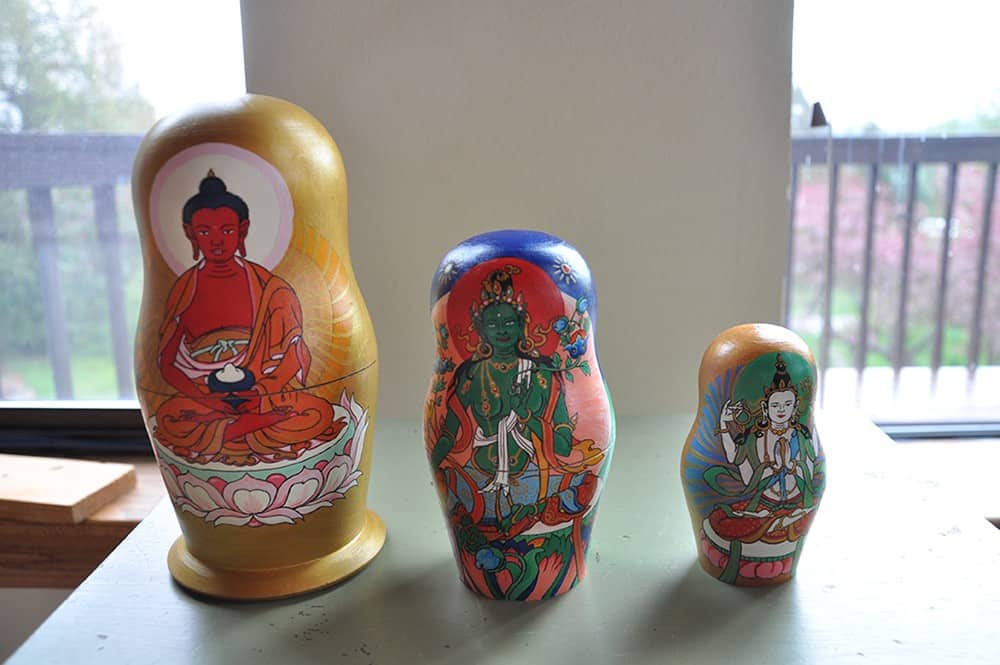Review of five faults and eight antidotes
The text turns to training the mind on the stages of the path of advanced level practitioners. Part of a series of teachings on the Gomchen Lamrim by Gomchen Ngawang Drakpa. Visit Gomchen Lamrim Study Guide for a full list of contemplation points for the series.
- Escaping Syria as an analogy for developing renunciation
- Benefits of serenity and developing aspiration to attain it
- Importance of studying the teachings on concentration
- Three types of laziness and their antidotes
- Antidotes to and causes of excitement and laxity
134 Gomchen Lamrim: Review of Five Faults and Eight Antidotes (download)
Contemplation points
- At the beginning of the review, Venerable Samten shared two pictures from Aleppo Syria and led a reflection likening the dire situation in Syria to our own dire situation in samsara. Do you often get lulled into complacency, forgetting that samsara is a place from which you’re trying to escape? What conditions do you have in your life that make it seem like samsara is pleasant? What would it take for you to be as desperate to get out of samsara as the Syrians are to escape the war zone that is their country?
- Consider: Lama Tsong Khapa said that an uncontrolled mind cannot serve as a foundation for wisdom. In other words, cultivating serenity is the basis on which we develop insight and attain the path. Why is this so?
- Why is it important not to jump into serenity practice without training?
- Venerable Samten said that if you don’t know the benefits of a practice, you won’t put energy into it. Consider some of the benefits of cultivating serenity. Which are you most drawn to and why?
- You will have the desire and ability to engage in virtue and avoid non-virtue.
- It is the basis for a peaceful and enlightened mind.
- You will be happy, content, and full of delight.
- Your body will be blissful.
- On the basis of serenity, you can cultivate insight into the nature of reality.
- You attain supernormal powers that assist you in benefitting others.
- In cultivating serenity, we face five obstacles. It is important to know these, as well as their antidotes, in advance so that we’re ready when they arise. Consider each:
- Laziness – there are three types of laziness (procrastination, the laziness of busyness, discouragement). Consider how each of these plays a part in keeping you from your meditation practice. How might you use each of the four antidotes to laziness to overcome it (faith and confidence, aspiration, joyous effort, pliancy)? Be specific with examples from your own life.
- Forgetting the object of meditation – You get to the cushion, put your mind on the object and then you’re off, imagining something else. Do you find this often is the case in your meditation sessions? The antidote is mindfulness, a mental factor cultivated through practice. What can you do to practice mindfulness both on and off the cushion?
- Laxity (like being spaced out) and excitement (not being able to take the mind off attachment).Consider some of the conditions that allow these to arise and disturb your meditation session: not guarding the senses, eating too much, sleeping too much, lacking effort, not enjoying or caring about meditation. Which of these are most problematic for you? Why it is that time off the cushion interferes with time on the cushion? The antidote is introspective awareness, like a little spy that is always there watching for laxity and excitement to arise. What can you do to strengthen this factor of introspective awareness?
- Not applying the antidote – You notice your mind is going off the object and you just don’t apply the antidote. Have you noticed this resistance in your own mind? The antidote is to apply the correct antidote. What can you do in your own life to reinforce the importance and benefit of applying antidotes when one of the faults arises?
- Over-applying the antidote – You’ve removed the fault, but continue to apply the antidote (like continuing to reprimand a child even after they are behaving). The antidote is to stop applying the antidote. How have you seen this fault in your life?
- Recognizing that these faults are holding you back, keeping you stuck in samsara, resolve to make great effort to identify them in your life and apply the antidotes quickly.
Venerable Thubten Samten
Venerable Samten met Venerable Chodron in 1996 when the future Venerable Chonyi took the future Ven. Samten to a Dharma talk at Dharma Friendship Foundation. The talk on the kindness of others and the way it was presented is deeply etched in her mind. Four Cloud Mountain retreats with Ven. Chodron, eight months in India and Nepal studying the Dharma, one month of offering service at Sravasti Abbey, and a two month retreat at Sravasti Abbey in 2008, fueled the fire to ordain. This took place August 26, 2010 (see photos). This was followed by full ordination in Taiwan in March, 2012 (see photos), becoming Sravasti Abbey's sixth bhikshuni. Right after finishing a Bachelor of Music degree, Ven. Samten moved to Edmonton to pursue training as a corporeal mime artist. Five years later, a return to university to obtain Bachelor of Education degree opened the door to teaching for the Edmonton Public School board as a music teacher. Concurrently, Ven. Samten became a founding member and performer with Kita No Taiko, Alberta's first Japanese drum group. Ven. Samten is responsible for thanking donors who make offerings online; assisting Venerable Tarpa with developing and facilitating the SAFE online learning courses; assisting with the forest thinning project; tracking down knapweed; maintaining the Abbey database and answering email questions; and photographing the amazing moments that are constantly happening at the Abbey.

